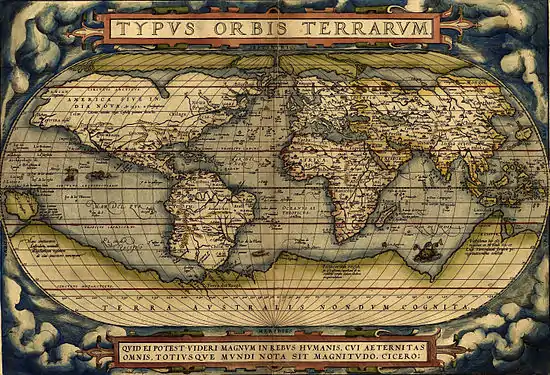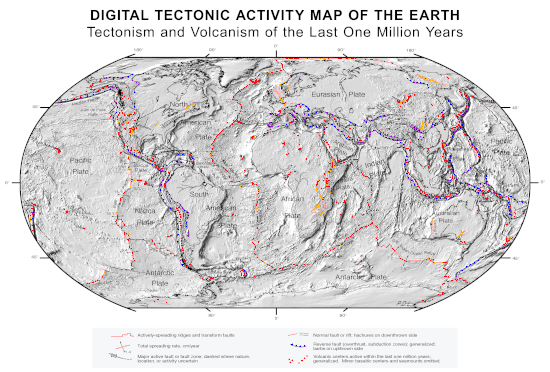Portal:World
The World Portal

In its most general sense, the term "world" refers to the totality of entities, to the whole of reality or to everything that is. The nature of the world has been conceptualized differently in different fields. Some conceptions see the world as unique while others talk of a "plurality of worlds". Some treat the world as one simple object while others analyze the world as a complex made up of many parts. In scientific cosmology the world or universe is commonly defined as "[t]he totality of all space and time; all that is, has been, and will be". Theories of modality, on the other hand, talk of possible worlds as complete and consistent ways how things could have been. Phenomenology, starting from the horizon of co-given objects present in the periphery of every experience, defines the world as the biggest horizon or the "horizon of all horizons". In philosophy of mind, the world is commonly contrasted with the mind as that which is represented by the mind. Theology conceptualizes the world in relation to God, for example, as God's creation, as identical to God or as the two being interdependent. In religions, there is often a tendency to downgrade the material or sensory world in favor of a spiritual world to be sought through religious practice. A comprehensive representation of the world and our place in it, as is commonly found in religions, is known as a worldview. Cosmogony is the field that studies the origin or creation of the world while eschatology refers to the science or doctrine of the last things or of the end of the world.
In various contexts, the term "world" takes a more restricted meaning associated, for example, with the Earth and all life on it, with humanity as a whole or with an international or intercontinental scope. In this sense, world history refers to the history of humanity as a whole or world politics is the discipline of political science studying issues that transcend nations and continents. Other examples include terms such as "world religion", "world language", "world government", "world war", "world population", "world economy" or "world championship". (Full article...)
Selected articles -
General images -
Megacities of the world -
 |
Lagos or Lagos City (Nigerian English: /ˈleɪɡɒs/; Yoruba: Èkó) is the most populous city in Nigeria as well as Africa, with an estimated population of 21 million in 2015. The estimated population for Lagos city was more than 24 million in 2022; and around 30 million for the Lagos metropolitan area, including the suburban area reaching far into the neighbouring Ogun State, thus making Lagos the most populous urban area in Africa. Lagos was the national capital of Nigeria until December 1991 following the government's decision to move their capital to Abuja in the centre of the country. Lagos is a major African financial centre and is the economic hub of Lagos State and Nigeria at large. The city has been described as the cultural, financial, and entertainment capital of Africa, and is a significant influence on commerce, entertainment, technology, education, politics, tourism, art, and fashion. Lagos is also among the top ten of the world's fastest-growing cities and urban areas. The megacity has the fourth-highest GDP in Africa and houses one of the largest and busiest seaports on the continent. The Lagos metropolitan area is a major educational and cultural centre in Sub Saharan Africa. Due to the large urban population and port traffic volumes, Lagos is classified as a Medium-Port Megacity.
Lagos emerged as a home to the Awori subgroup of the Yoruba of West Africa islands, which are contained in the present day Local Government Areas (LGAs) of Lagos Island, Eti-Osa, Amuwo-Odofin and Apapa. The islands are separated by creeks, fringing the southwest mouth of Lagos Lagoon, while being protected from the Atlantic Ocean by barrier islands and long sand spits such as Bar Beach, which stretch up to 100 km (62 mi) east and west of the mouth. Due to rapid urbanisation, the city expanded to the west of the lagoon to include areas in the present day Lagos Mainland, Ajeromi-Ifelodun, and Surulere. This led to the classification of Lagos into two main areas: the Island, which was the original city of Lagos, and the Mainland, which it has since expanded into. This city area was governed directly by the Federal Government through the Lagos City Council, until the creation of Lagos State in 1967, which led to the splitting of Lagos city into the present-day seven Local Government Areas (LGAs), and an addition of other towns (which now make up 13 LGAs) from the then Western Region to form the state. (Full article...)Did you know -
- ... that the Engineers' Club Building and Engineering Societies' Building in New York City were described in the mid-20th century as "the engineering crossroads of the world"?
- ... that following World War II, members of Bangkok's British Club were able to reclaim their building thanks to a mortgage that helped preserve its land deeds?
- ... that the 1992 book A Song for Arbonne is set in a fantasy world loosely based on 12th-century Provence?
- ... that Carver Court in Coatesville, Pennsylvania, was built to house African-American steelworkers during World War II?
- ... that the McLaren MCL36, McLaren's 2022 Formula One car, has been in development since 2019 because of the pandemic's interruptions to the sport?
- ... that Joe Davis, champion from 1927 to 1946, remains the only undefeated player at the World Snooker Championship?
- ... that Lucien Laurent scored the first goal in FIFA World Cup history during the inaugural game of Group 1 of the 1930 World Cup?
- ... that the DK Atlas of World History includes maps on the spread of agriculture and the movement of indentured servants?
Countries of the world -
.svg.png.webp)
The United States of America (U.S.A. or USA), commonly known as the United States (U.S. or US) or America, is a country primarily located in North America. It consists of 50 states, a federal district, five major unincorporated territories, nine Minor Outlying Islands, and 326 Indian reservations. The United States is the world's third-largest country by both land and total area. It shares land borders with Canada to its north and with Mexico to its south and has maritime borders with the Bahamas, Cuba, Russia, and other nations. With a population of over 333 million, it is the most populous country in the Americas and the third most populous in the world. The national capital of the United States is Washington, D.C., and its most populous city and principal financial center is New York City.
The Seven Wonders of Portugal (Portuguese: Sete Maravilhas de Portugal) is a list of cultural wonders located in Portugal. The creation of the list was supported by the Ministry of Culture and organized by the companies Y&R Brands S.A. and Realizar S.A.
Initially 793 national monuments of Portugal were listed by Instituto Português do Património Arquitectónico (IPPAR) as candidates, however in the first round of selections a board of experts reduced the number to 77. The contenders were further reduced to 21 finalist in four different categories by Conselho de Notáveis at the University of Évora. (Full article...)Related portals
Protected areas of the world -
Selected world maps
World records
- List of Olympic records in athletics
- List of world records in athletics
- List of junior world records in athletics
- List of world records in masters athletics
- List of world youth bests in athletics
- List of IPC world records in athletics
- List of world records in canoeing
- List of world records in chess
- List of cycling records
- List of world records in track cycling
- List of world records in finswimming
- List of world records in juggling
- List of world records in rowing
- List of world records in speed skating
- List of world records in swimming
- List of IPC world records in swimming
- List of world records in Olympic weightlifting
Topics
Categories
Wikimedia
The following Wikimedia Foundation sister projects provide more on this subject:
-
 Commons
Commons
Free media repository -
 Wikibooks
Wikibooks
Free textbooks and manuals -
 Wikidata
Wikidata
Free knowledge base -
 Wikinews
Wikinews
Free-content news -
 Wikiquote
Wikiquote
Collection of quotations -
 Wikisource
Wikisource
Free-content library -
 Wikispecies
Wikispecies
Directory of species -
 Wikiversity
Wikiversity
Free learning tools -
 Wikivoyage
Wikivoyage
Free travel guide -
 Wiktionary
Wiktionary
Dictionary and thesaurus
More portals
-
 List of all portalsList of all portals
List of all portalsList of all portals -
 The arts portal
The arts portal -
 Biography portal
Biography portal -
 Current events portal
Current events portal -
 Geography portal
Geography portal -
 History portal
History portal -
 Mathematics portal
Mathematics portal -
 Science portal
Science portal -
 Society portal
Society portal -
 Technology portal
Technology portal -
 Random portalRandom portal
Random portalRandom portal -
 WikiProject PortalsWikiProject Portals
WikiProject PortalsWikiProject Portals






.jpg.webp)












.jpeg.webp)


































.svg.png.webp)






.jpg.webp)












.jpg.webp)
































.svg.png.webp)
.svg.png.webp)
.svg.png.webp)
.svg.png.webp)


.svg.png.webp)
_political.svg.png.webp)
.svg.png.webp)
.svg.png.webp)
.svg.png.webp)

